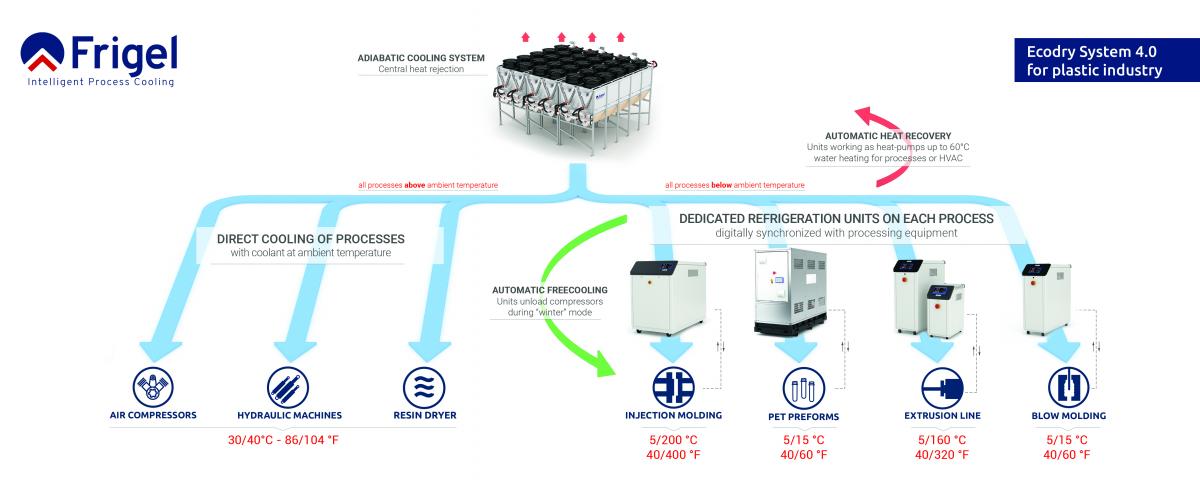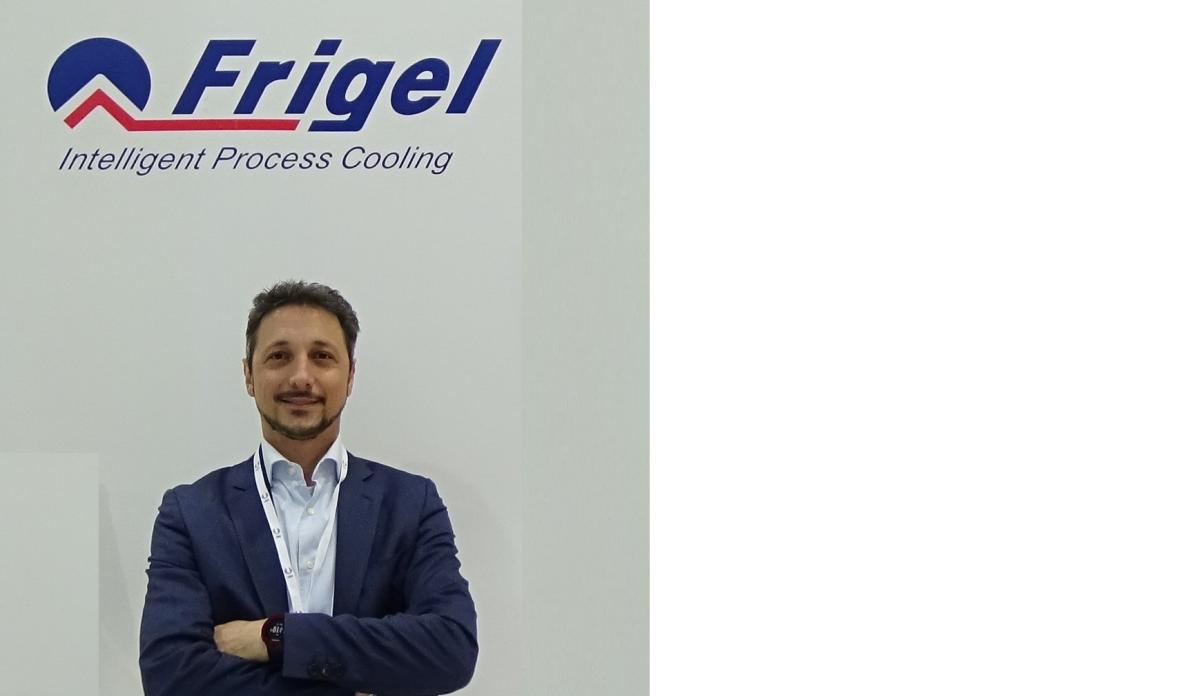Frigel Firenze S.p.A., global leader in advanced process cooling technology, is transforming the beverage and beverage packaging industry with its innovative process cooling technology. The Italy-based company, which has been providing high-performing applications around the world for more than 50 years now, hopes to use technology to improve not just efficiency and performance but also overall cost management for manufacturers.
Frigel is currently concentrating on two divisions: its plastic conversion line and beverage and beverage-related plastic packaging. While it remains committed to innovating on cooling equipment for its core business, the company is keen to make a mark in the fast-growing beverage plastic packaging segment. It provides equipment to bottlers, for example, to cool the beverages during the production phase.
“Green” cooling system delivers greater efficiency, savings
The company’s new EcoDry cooling system aims to replace a traditional cooling tower, which whilst being widely popular consumes much more water and energy. Ideal for processes that require water at environmental temperature, Frigel’s patented system uses an adiabatic chamber where air is dehumidified at certain seasons of the year and hours of the day in hot and humid climates to make it a little bit colder. However most of the time it works dry, with consumption of water equal to zero.
The intelligent process cooling approach can cover all cooling demands in the beverage and beverage packaging industry as well as in other industries. The EcoDry and Microgel, which the company demonstrated at the recently concluded ProPak Asia 2018 in Bangkok, Thailand, delivers consistent temperature, flow rate and pressure to cut, for example for preform making,the cycle time by up to 20%, thereby increasing machine capacity and output.. The precise water temperature and flow enable nonstop use to ensure processing lines run consistently at the highest throughput. This results in less downtime and up to 20% to 30% greater productivity in many beverage processes, in particular those that require high delta in temperature.

The EcoDry closed-loop dry cooling system consumes between 95% to 99,9% less water than a traditional cooling tower. With its ambient air, “free cooling” capability, low thermal losses, efficient motors and intelligent control systems, the EcoDry reduces energy use by up to 97.5% compared with air-cooled central chillers. It also requires less maintenance and guarantees greater uptime. The overall maintenance and safety cost savings can reach as much as 90%.
Meanwhile, the modular design makes installation simpler and easier. The EcoDry comes with one set of uninsulated pipes and can work with existing pumps and filtration equipment. It can be easily expanded, adding more ventilators or with a line of durable pumping and filtration equipment at any time to accommodate any plant expansion or updating needs.
When coming instead to the range of Frigel’s chiller, the optimised refrigeration efficiency, free cooling and lower gas consumption resulting from the heat recovery option enable Figel Chillers like Microgel of Multistage to cut the carbon footprint by as much as 50%. They likewise present low emission risks too.
For example the Multistage chiller, besides being ammonia-free like any Frigel chiller, has the lowest GWP today. It operates innocuous refrigeration gas and is divided into several separated chillers in cascade, which means a very little quantity of gas loaded and the best in class COP for application requiring high delta temperature (i.e. carbo mixing, wort cooling, pasteurizing, etc.).
Mr. Roberto Sommi, Frigel sales director for PET & Beverage, noted the positive feedback the EcoDry has been receiving across many countries. “This patented application is designed to replace a cooling tower. It is capable of doing the same job as a cooling tower but at 90% to 99% less water consumption depending on the climate. From an environmental point of view, it is definitely more “green” than conventional approaches currently used. From a cost perspective, it results in a substantial decrease in operational expenses,” he said.
The company can tailor a complete solution to a client’s particular needs. It conducts a survey and technical analysis of a client's facility and based on this evaluation, designs a solution that also takes into account existing usable components and impact on current plant operation. The products are adaptable to conditions at the facility and may use existing parts such as pumps and tanks.
Sustainability is at the heart of development work at Frigel. While the company’s innovative technologies aim to boost operational performance and competitive edge, they are also designed to reduce water, chemical and energy use. Combined, these enable companies to achieve an operation that is environmentally sustainable and generates a lot of savings.

Mr. Roberto Sommi, Frigel sales director for PET & Beverage
Southeast Asia, exciting market
The company acknowledges it is a good time to be growing its market in Southeast Asia. Despite the differences across countries in the region in terms of industry growth and demand for cooling technologies, Frigel sees strong growth opportunities in Southeast Asia overall.
“Some countries such as Vietnam, Malaysia and even Thailand are a bit more mature than the others. But even then, the markets in these nations are still expanding very fast,” Mr. Sommi said.
In the beverage sector, in particular, the continued market growth is encouraging more companies, both local and multinational, to invest in new production plants or in expanding existing facilities. Either of these augurs well for Frigel as it means rising demand for its cooling equipment.
The company’s manufacturing facility in Bangkok, which was opened in 2015, serves as its regional branch providing not only sales but also aftersales services. The 9,000-square-metre plant has the capability to churn out more or less 70% of Frigel’s product portfolio, offering substantial savings in terms of shipment costs and delivery time. These combined have helped Frigel boost its presence in the Asia-Pacific even more.
Frigel has indeed carved its market footprint across many industries. The company has built a reputation of being a market leader in the plastic industry in the region, according to Mr. Sommi.
“We have several thousands of installations already running in the region, and our plan is to at least double our presence within the next five years. So we are really committed to growing our Southeast Asian market,” he added.
Frigel is particularly keen in expanding more in Malaysia and Indonesia. The Philippines is another key market for Frigel at present.
“The Philippines is probably the best market for us at the moment. We have established our name in the country and have plenty of installations running. But what makes the country a big market for Frigel now is it’s one of the first markets going beyond typical carbonated soft drinks and into new products,” Mr. Sommi shared.
The growing trend for nontraditional beverage products in the Philippines, itself spurred by more consumers pursuing a healthier lifestyle, is fuelling the industry’s rapid expansion. Besides soft drinks and juices, Philippine beverage manufacturers are developing new varieties such as coconut water, vitaminic water and other health drinks. The broader product portfolios and rising demand are prompting manufacturers to expand facilities or upgrade existing plants, which then translates into new installation or equipment replacement requirements that Frigel can fill.
Overall cost reduction, a focus
Innovation work in Frigel revolves around improving cost management for the client’s facility. With traditional cooling systems being typically heavy users of electricity and water, Frigel underscores products and technologies that dramatically reduce the consumption of both electricity and water toward decreasing the overall overhead expense of the manufacturing plant.
Mr. Sommi notes Frigel has specifically designed cooling equipment for beverages that aim to address energy usage issues. “In a bottling company, for example, on average 20% of the total electricity bill links back to the cooling equipment. If we, through our products, are able to lower this percentage share, then we contribute to reducing the total costs for that client,” he added.
This emphasis likewise enables Frigel to advance its goal of helping companies incorporate green practices in their manufacturing processes.
“Sustainability is one keyword. Reducing the operating cost is another catchphrase. We’d like to think that by directing our innovations in this manner we are also playing a key role in advancing new technologies that are planet-friendly. So we are delivering more value to our customers and the industry as a whole.”
Europe-based R&D
Frigel allocates at least 10% of revenue to R&D, which is done in the company’s headquarters in Italy.
From product design through initial industrial products, everything is completed in the Italy facility. After consolidation, the products are then distributed to the three other production facilities around the world, including the one in Bangkok.
With this product lifecycle, normally after about one year, the products are available in local markets outside Italy for manufacture and then distribution.
But with its headquarters being in Europe, Frigel contends with high costs and therefore does not focus on low-cost products.
“So we invest a lot in R&D. This way we are able to differentiate ourselves and offer our customers something truly of value,” Mr. Sommi closed.
Related video
Roberto Sommi on Frigel cooling system
Bodega













